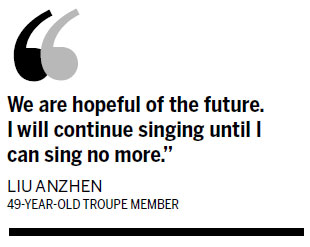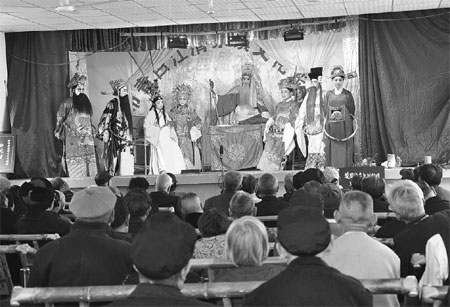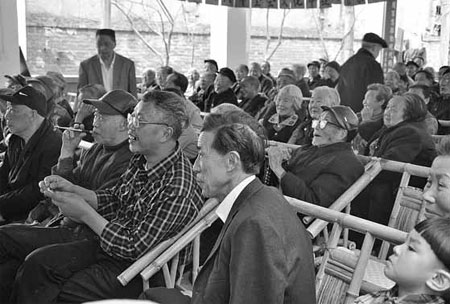Melodic heritage
Updated: 2013-07-24 07:21
By Liu Xiangrui (China Daily)
|
||||||||
|
Yan Laowu's Sichuan Opera troupe, one of the surviving small "torch troupes" in Sichuan, performs in Qingquan, a small town in suburban Chengdu. Photos by Liu Xiangrui / China Daily |
|
Fans of Sichuan Opera, mostly elderly people, enjoy a performance by Yan Laowu's troupe. |

While high-tech modern theaters are the rave these days, Sichuan operas performed on makeshift stages still attract diehard fans. Liu Xiangrui reports in Chengdu.
It's a simple theater, and dozens of elderly are seen seated on rows of chairs long before the show begins.
During the three-hour-long show, some in the audience are so enthralled that they tap their fingers to the music, while others whisper to those around them. There are also some who are seen snoring away.
The bamboo chairs creak whenever someone occasionally rise for the toilet or to replenish the cups with free tea, but the singing goes uninterrupted.
It's a common sight every afternoon at a compound in suburb Chengdu's Qingquan town, the latest performing site of Yan Laowu's Sichuan Opera troupe.
As a cultural label of the province, age-old traditional Sichuan Opera had its glorious days. In the past, the province had a large number of government-funded and private troupes.
But, many county-level troupes were disbanded in the 1980s because of cultural reform and the thriving of TV and films. Yet some former troupe members have decided to continue a stage life by re-establishing their own troupes.
Such troupes travel to new places and perform mainly for grassroots communities.
There are about 15 grassroots troupes that perform regularly in Chengdu and its surrounding areas.
Such troupes are called "torch troupes" by locals, as the shows are usually staged at night in the open in the past, and many fans would come from distant villages with torches in hands.
"The troupes may be disbanded because of financial pressure. But just like a torch that might be blown off when the wind is too strong, it can also be lighted again by someone who really loves it at any time," Yan explains.
Yan's troupe, formed by four couples - former actors from county-level troupes, and several amateur performers who are big opera fans - is a typical "torch troupe". The members are relatives, friends or people from the same place.
Unable to afford high rentals for performing sites in the cities, they usually stay in the suburbs or small towns.
Their latest site is in Qingquan, after performing at a nearby town for a year. Moving is a tiring project. "Efficiency is our first concern. We wrapped up all our stuff in just one afternoon," says Yan Dandan, 18, who is the youngest member in the troupe.
The members performed almost immediately after they arrived in their new destination, according to Yan.
After two-and-half-hours' performance, Yan Dandan was too tired to move, the girl recalls.
The troupe stages plays almost every day. The troupe also creates new plays when they stay longer in one place.
"We hardly repeat the same play in one place," says Yan Laowu. "Otherwise, people will not come again."
Compared with troupes at formal theaters, their performance is much more flexible. They often improvise their plots or lines, using common modern words like "Bye-bye" to amuse the audience.
The troupe attracts about 70 viewers a day, who pay 8 yuan ($1.30) per ticket. Each member earns about 40 yuan a day.
For many locals, especially the elderly, Sichuan Opera has been a part of their lives.
Yang Xibei, 75, who lives 20 kilometers away, often spends one hour, transferring two times, on buses to enjoy the show with his wife, an opera fan too.
"We'd come here unless we have important things to do," says Yang. "I have been watching the opera since I was a child. For me, it is more enjoyable than watching TV at home."
Luo Zhonghui, 78, often arrives early to secure a good seat even though it is a struggle walking a long distance.
"I enjoy talking with the actors and fellow fans. We all know each other well here," Luo says, adding that most of the audience feels at home with one another.
Many old fans would even follow the troupes when they move. Some even bring food as gifts, such as meat, oil and vegetables, for the troupe members.
The troupe has been receiving more support from local government in the past two years.
In 2012, it succeeded in applying for funds totaling 40,000 yuan from Chengdu's cultural bureau.
The performing site and living space are free and authorities invested to build the simple theater equipped with chairs.
"We are hopeful of the future," says troupe member Liu Anzhen, 49. "I will continue singing until I can sing no more."
But the members have their concerns, too.
"Every year we witness a row of spectators disappear," Zhao Li, Yan Laowu's wife, says, adding that most of the fans are old people.
Actors including Yan are worried about the succession of the art.
"I have been performing opera all my life. I will do anything to ensure its survival, at least during my time," Yan says. "But I cannot be sure it will be around in the next generation."
Contact the writer at liuxiangrui@chinadaily.com.cn.
Li Yu in Chengdu contributed to the story.
(China Daily USA 07/24/2013 page10)
Most Viewed
Editor's Picks

|

|

|

|

|

|
Today's Top News
US diplomat says China ties a priority
Nation falling short on IT security
Weiner not dropping out of NYC mayoral race
Death toll from H1N1 in Argentina reaches 38
DPRK halt on rocket facility confirmed
Celebrations erupt after word of regal delivery
Office to close due to protest in Manila
Multinationals' dependence on China grows
US Weekly

|

|
















